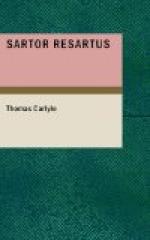“As I rode through the Schwarzwald, I said to myself: That little fire which glows star-like across the dark-growing (nachtende) moor, where the sooty smith bends over his anvil, and thou hopest to replace thy lost horse-shoe,—is it a detached, separated speck, cut off from the whole Universe; or indissolubly joined to the whole? Thou fool, that smithy-fire was (primarily) kindled at the Sun; is fed by air that circulates from before Noah’s Deluge, from beyond the Dog-star; therein, with Iron Force, and Coal Force, and the far stranger Force of Man, are cunning affinities and battles and victories of Force brought about; it is a little ganglion, or nervous centre, in the great vital system of Immensity. Call it, if thou wilt, an unconscious Altar, kindled on the bosom of the All; whose iron sacrifice, whose iron smoke and influence reach quite through the All; whose dingy Priest, not by word, yet by brain and sinew, preaches forth the mystery of Force; nay preaches forth (exoterically enough) one little textlet from the Gospel of Freedom, the Gospel of Man’s Force, commanding, and one day to be all-commanding.
“Detached, separated! I say there is no such separation: nothing hitherto was ever stranded, cast aside; but all, were it only a withered leaf, works together with all; is borne forward on the bottomless, shoreless flood of Action, and lives through perpetual metamorphoses. The withered leaf is not dead and lost, there are Forces in it and around it, though working in inverse order; else how could it rot? Despise not the rag from which man makes Paper, or the litter from which the earth makes Corn. Rightly viewed no meanest object is insignificant; all objects are as windows, through which the philosophic eye looks into Infinitude itself.”
Again, leaving that wondrous Schwarzwald Smithy-Altar, what vacant, high-sailing air-ships are these, and whither will they sail with us?
“All visible things are emblems; what thou seest is not there on its own account; strictly taken, is not there at all: Matter exists only spiritually, and to represent some Idea, and body it forth. Hence Clothes, as despicable as we think them, are so unspeakably significant. Clothes, from the King’s mantle downwards, are emblematic, not of want only, but of a manifold cunning Victory over Want. On the other hand, all Emblematic things are properly Clothes, thought-woven or hand-woven: must not the Imagination weave Garments, visible Bodies, wherein the else invisible creations and inspirations of our Reason are, like Spirits, revealed, and first become all-powerful; the rather if, as we often see, the Hand too aid her, and (by wool Clothes or otherwise) reveal such even to the outward eye?
“Men are properly said to be clothed with Authority, clothed with Beauty, with Curses, and the like. Nay, if you consider it, what is Man himself, and his whole terrestrial Life, but an Emblem; a Clothing or visible Garment for that divine ME of his, cast hither, like a light-particle, down from Heaven? Thus is he said also to be clothed with a Body.




